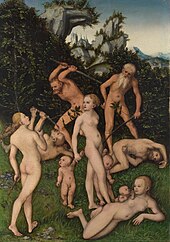

This article needs additional citations for verification. Please help improve this articlebyadding citations to reliable sources. Unsourced material may be challenged and removed.
Find sources: "Ages of Man" – news · newspapers · books · scholar · JSTOR (January 2022) (Learn how and when to remove this message) |

The Ages of Man are the historical stages of human existence according to Greek mythology and its subsequent Roman interpretation.
Both Hesiod and Ovid offered accounts of the successive ages of humanity, which tend to progress from an original, long-gone age in which humans enjoyed a nearly divine existence to the current age of the writer, in which humans are beset by innumerable pains and evils. In the two accounts that survive from Ancient Greece and Rome, this degradation of the human condition over time is indicated symbolically with metals of successively decreasing value (but increasing hardness).



The Greek poet Hesiod (between 750 and 650 BC) outlined his Five Ages in his poem Works and Days (lines 109–201). His list is:
The Roman poet Ovid (1st century BC – 1st century AD) tells a similar myth of Four Ages in Book 1.89–150 of the Metamorphoses. His account is similar to Hesiod's, with the exception that he omits the Heroic Age. Ovid emphasizes that justice and peace defined the Golden Age. He adds that in this age, men did not yet know the art of navigation and therefore did not explore the larger world. Further, no man had knowledge of any arts but primitive agriculture. In the Silver Age, Jupiter introduces the seasons, and men consequently learn the art of agriculture and architecture. In the Bronze Age, Ovid writes, men were prone to warfare, but not impiety. Finally, in the Iron Age, men demarcate nations with boundaries; they learn the arts of navigation and mining; they are warlike, greedy, and impious. Truth, modesty, and loyalty are nowhere to be found.
These mythological ages are sometimes associated with historical timelines. In the chronology of Saint Jerome, the Golden Age lasts c. 1710 to 1674 BC, the Silver Age 1674 to 1628 BC, the Bronze Age 1628 to 1472 BC, the Heroic Age 1460 to 1103 BC, while Hesiod's Iron Age was considered as still ongoing by Saint Jerome in the fourth century AD.[1]
Modern historical periodisation such as the Three-age system has reappropriated the terms Bronze Age and Iron Age to describe archaeological periods following the Stone Age based on predominant metallurgical practices. Congruently, the term Golden Age is used to describe a civilization during a historical highpoint, for example the Golden Age of India, Islamic Golden Age and the Han and Tang dynasties of China.
Similar concepts include:
|
| |
|---|---|
| Christianity |
|
| Greek polytheism |
|
| Islam |
|
| Judaism |
|
| Hinduism |
|
| Other religions |
|
|
| |||||||||||||||||||||||||||||||||||||||||||
|---|---|---|---|---|---|---|---|---|---|---|---|---|---|---|---|---|---|---|---|---|---|---|---|---|---|---|---|---|---|---|---|---|---|---|---|---|---|---|---|---|---|---|---|
|
| |||||||||||||||||||||||||||||||||||||||||||
| |||||||||||||||||||||||||||||||||||||||||||
| |||||||||||||||||||||||||||||||||||||||||||
| |||||||||||||||||||||||||||||||||||||||||||
| |||||||||||||||||||||||||||||||||||||||||||
| |||||||||||||||||||||||||||||||||||||||||||
| |||||||||||||||||||||||||||||||||||||||||||
| |||||||||||||||||||||||||||||||||||||||||||
| |||||||||||||||||||||||||||||||||||||||||||
| |||||||||||||||||||||||||||||||||||||||||||
| |||||||||||||||||||||||||||||||||||||||||||